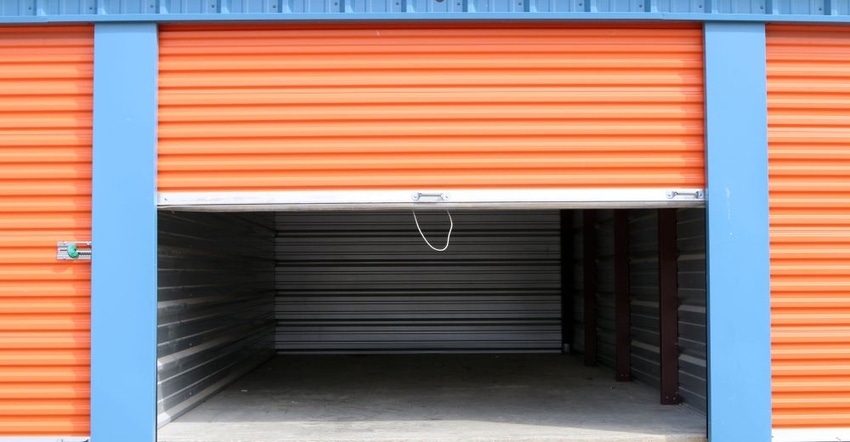Keeping unit doors in good working order should be a part of every self-storage operator’s maintenance plan. A lawsuit brought by a tenant who was injured by a faulty door reminds us why we must take steps to minimize risk. Read the story and get practical advice.

It isn’t unusual for injuries to occur on self-storage properties. Notwithstanding their increasingly welcoming exteriors, storage facilities are still primarily comprised of metals doors and hallways, and tenants are largely lifting and moving property inside. Accidents are bound to happen.
A case decided in North Carolina in 2014 serves as a reminder when it comes to unit-door safety and risk. In Hyatt v. Mini Storage on the Green (North Carolina Court of Appeals), a lawsuit was filed by a tenant who was injured when a roll-up door came off its tracks and struck him in the head. The customer claimed the storage facility—and its metal-door installer—were liable for negligence in creating a condition that led to his wound.
The tenant alleged the unit door had been broken but was never repaired, so one lesson facility operators can take from this is how important it is to be aware and responsive any time you see or learn of a dangerous condition your property. To avoid claims, regularly inspect and maintain your unit doors, gates and any other building components with which tenants interact.
The next lesson is equally important. In this case, the facility operator had included in the rental agreement specific language about the tenant’s risk of injury on the property: “Landlord shall not be liable to tenant and/or tenant’s guests or invitees for any personal injuries sustained by tenant and/or tenant’s guests or invitees while on or about the Landlord’s premises.”
The self-storage operator argued his property should be dismissed from the lawsuit because the tenant agreed to accept the risk of injury and waived his right to collect against the facility if any such injury occurred. The trial court and court of appeals agreed with this defense and dismissed the tenant’s claim. It offered the following important findings as part of its decision:
The lease language was enforceable because it was “clear and unambiguous,” explicit and sufficient to absolve the storage facility from liability.
The language was fair and not the result of unequal bargaining power between the tenant and the landlord. The court said that in self-storage, the tenant retains power if he’s uncomfortable with the terms of the lease to simply go to another facility. In fact, the tenant admitted there was another facility “up the road” he could’ve selected.
Lastly, there was no public-policy concern about upholding this contractual waiver language and self-storage was not the type of industry where the public had to be protected.
Door Maintenance
To avoid human injury from your self-storage unit doors and, therefore, the risk and penalty of a related lawsuit, regularly inspect and maintain your doors to ensure they’re in good working order. This includes examining mechanical components such as felt strips, springs, axles, guides, mounting plates, fasteners and the bottom seal. Consider the following:
Check to ensure the felt strip is still attached to the inside of the curtain. Reattach it if loose or replace it if missing. Order a roll ahead of time so you have it on hand, and use 3M Super 77 Spray Glue.
Lightly coat the springs using a spray silicone lubrication. Rusty springs lead to friction and drag, causing door chatter.
Use a Q-Tip to force a pea-sized amount of grease at each axle pivot location, and inspect the axle for galling and abrasion.
Check to ensure the nylon guide strips are in place. If missing, install new ones, as these are important for door function.
Wipe guides from top to bottom to remove grease and debris. Never lubricate the door guides!
Apply a small amount of dry silicone spray to the latching mechanism.
Include a “personal injury” waiver in your lease that clarifies the tenant’s agreement and understanding that he’s entering an area that has inherent dangers and he waives any claims for injuries to himself or those who act on his behalf. If you properly inspect and maintain your facility (as we’ve already established you should), then you can in good faith respond to any claim by saying you have a demonstrable record of regular maintenance and care for your property.
Every self-storage environment presents some danger to staff, tenants and guests. It’s up to you to minimize any risk through regular maintenance of unit doors and other building components. Also, review your rental agreement to protect yourself and the business in the event an incident does occur.
This article was authored by Scott I. Zucker, a founding partner in the Atlanta law firm of Weissmann Zucker Euster Morochnik & Garber P.C. Practicing law since 1987, Scott represents self-storage owners and managers on legal matters including property development, facility construction, lease preparation, employment policies and tenant-claims defense. To reach him, email [email protected].
Additional information was provided by Mark Pickard, CEO of Keepster Protection, developer of Keepster Pro, a device for self-storage unit doors that provides a safeguard for latch, header and door protection. Visit www.keepsterpro.com for details.
About the Author(s)
You May Also Like





